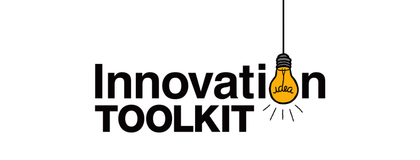
The Innovation Toolkit
Our Toolkit
The Innovation Toolkit is a process for problem-solving. It uses tools commonly found in entrepreneurship and innovation to help you tackle wicked problems on the issues that matter.
For over ten years, The John F. Wood Centre at the University of Guelph has led in community engagement, entrepreneurship, and innovation. We have adapted these tools from our work and research in those fields and codified them into a simple toolkit for use by students, entrepreneurs, business leaders, and community members. These tools are designed to support many groups. Students in particular will find further applications in first year seminars, fourth year capstone classes, skill-development graduate classes, industry-driven hackathons, pitch competitions, and everything in between.
How do we use this problem-solving framework?
The Innovation Toolkit uses multiple phases of convergent and divergent thinking.
In divergent thinking, learners are thinking in a creative and expansive manner whereas in convergent thinking, learners are synthesizing, categorizing, or distilling their ideas down, usually with the purpose of making a decision (Chermahini and Hommel, 2012).
This toolkit follows three phases:
Investigative in nature, you’ll identify root causes to the problem, understanding the context (socio-political, environmental, organizational, etc.) in which your problem is rooted. All frameworks have humans, and the needs users face at the center of the investigation. This phase is a process of divergent thinking in assessing the landscape of their problem, then converging your thinking into insights and problem statements.
Creative in nature, you’ll use divergent thinking to ideate (think: wild brainstorming!) around the output of the previous phase (problem statement). Once all ideas have been generated, you must assess the value of your ideas and decide which ones you’ll proceed with.
Action-oriented and strategic in nature, this phase has you develop plans for implementing your idea(s). This typically involves assessing the value the solution will provide to intended users, communication plans focused on persuasion, and project management and resource allocation strategies. The result of the implementation phase is either intrapreneurship (implementing a new idea within an existing organization) or entrepreneurship (bringing a new idea to market).
Using The Innovation Toolkit
To use the Innovation Toolkit students must register through CourseLink. Follow these instructions below to begin!
The Wood Centre can help you reinforce critical thinking and creativity in your course.
Are you interested in having your students unlock the power of Design Thinking? The Wood Centre provides a hands on learning opportunity for your students where they will create solutions to real world problems.
Why Engage with The Wood Centre?
- Increase student engagement
- Provide real world content
- Reinvigorate your course
- Engage with community
- Embrace teaching innovation
Are you a University of Guelph student, staff or faculty? Would you like to enroll in the Wood Centre's Innovation Toolkit?
Follow these instructions to self enroll using your single sign-on through CourseLink. If you are not a student, staff or faculty member please contact us
Learn More
Faculty members across all colleges are welcome to apply. Whether you are looking for a case study to embed into your course or you are looking an organization to partner with, we can help.
We use the online application to learn more information about your requirements and needs. This will allow us to begin a conversation about how we can provide you with the appropriate support and resources. Once we receive your submission, we will review and get in touch shortly.
We offer faculty three resources:
- Case studies with local organizations to embed in your course,
- Mentoring opportunities with U of G students, and
- Research/consulting opportunities with local organizations.
There are a lot of benefits from working with The Wood Centre. Embedding a case study into your course is an excellent way to engage students with real world material. Partnering with a community organization provides an opportunity to work with the local community to make a positive impact. Lastly, mentoring students allows for a rich and rewarding experience that provides invaluable support to students requiring guidance and expertise.
Get More Info
More questions? Please contact us.
